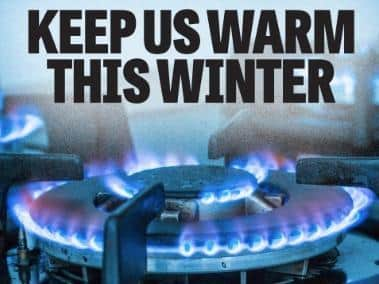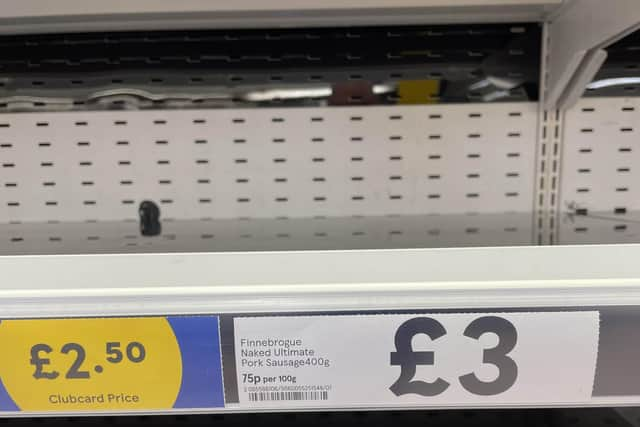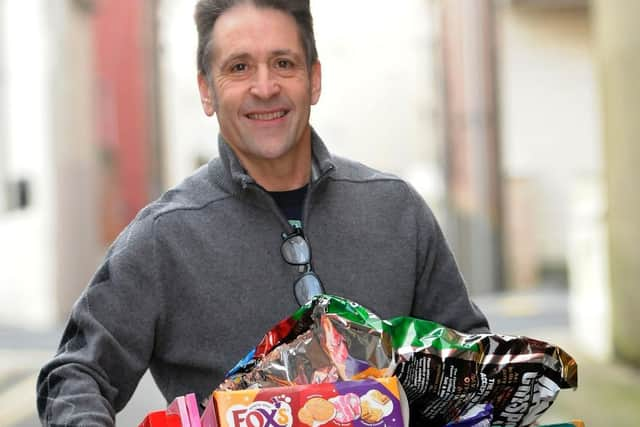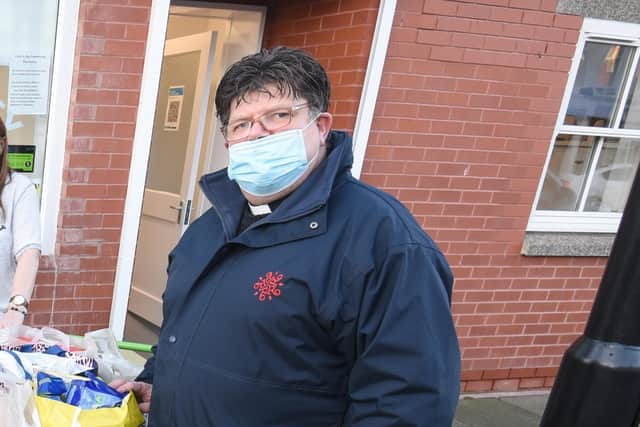Keep Us Warm This Winter campaign: Carbon dioxide shortages and price spikes could risk empty shelves, industry experts warn
and live on Freeview channel 276
The Government was forced to strike a deal with the firm on Tuesday, agreeing to bail it out with “many millions of pounds” for the next three weeks in order to prevent disruption to the UK’s food supplies.
CO2 is critical to food production, used for the humane slaughter of livestock, extending the shelf-life of products and is vital to cooling systems for refrigeration purposes.
Advertisement
Hide AdAdvertisement
Hide AdSupplies of CO2 were expected to return on Wednesday, but Environment, Food and Rural Affairs Secretary George Eustice said that companies will have to accept a major hike in CO2 rates, which could increase fivefold from £200 a tonne to £1,000.


He stressed that the surge in prices would not be a “major impact on food prices” for consumers due to its small proportion of overall costs.
However, the British Meat Processing Association (BMPA) warned that CO2 price shifts could “prompt price distortion in other markets.”
A spokeswoman for the BMPA said: “The announcement that the Government has secured a deal with CF Industries to reopen one of their fertiliser plants comes as a huge relief in the short term and will allow meat producers to continue their operations beyond next week.
Advertisement
Hide AdAdvertisement
Hide Ad“But, we do not underestimate the challenge that faces us over the next three weeks.


“If we are to return to a normal functioning of the CO2 market, there will need to be some complex discussion on how to re-negotiate and restructure CO2 supply and pricing in the UK.”
Meanwhile, with Christmas approaching and many consumers planning ahead, food and drink availability was still of concern to some industry experts.
Emma McClarkin, chief executive of the British Beer & Pub Association, said: “With ongoing supply chain disruption still impacting on our sector and the busy Christmas period fast approaching, the burden of additional costs or further interruptions to the supply of CO2 would be extremely damaging to the recovery of the sector.”
Advertisement
Hide AdAdvertisement
Hide AdThe knock-on effects of rising gas prices, C02 shortages and price hikes, and a lack of labourers and lorry drivers could detrimentally impact residents on the Fylde coast, particularly those who are in need of help from food banks.


As gas prices risk scarcity among supermarket shelves, pairing this with the cut to Universal Credit and not enough people to drive distribution trucks could spell disaster for many vulnerable people, food banks warned.
Volunteers were already preparing for a surge in users after the Government announced it would be cutting Universal Credit by £20 a week, but they now say with those benefits being lost, in addition to extra money being asked of people for energy, referrals to food banks could increase even more.
Kim Cook, chairwoman of trustees of Fylde Foodbank, said she expects the number of referrals for its services to increase if the expected energy hike goes ahead.
Advertisement
Hide AdAdvertisement
Hide Ad"People may have to choose between turning off their heating or skipping meals, and many households could be plunged into hardship," she said.


Father John Hall, vicar of the parish of St David’s and St Peter’s in Fleetwood, said the town's food bank The Pantry would likely see even more people than the 200 it serves weekly at the moment.
His main concern for the town's residents was the cut to Universal Credit, and said most of the people he helps at The Pantry pay for energy through a meter.
"I think we could see a lot more people using us after the Universal Credit cut, especially when single people could be expected to live on just £50 a week," he said.
Advertisement
Hide AdAdvertisement
Hide Ad"That's our main priority at the moment - but in the coming weeks we could be getting more people realising that perhaps that £5 they put on their meters isn't lasting as long as well."
Neil Reid, chairman of Blackpool Food Bank, said food shortages and not enough distribution drivers or labourers could mean empty shelves would result in stores no longer producing surplus food items - which his food bank largely relies on to feed thousands of Fylde coast residents a week.
Blackpool Food Bank receives surplus food from stores, and redistributes it across Blackpool, Wyre and Fylde in a bid to tackle food waste and feed vulnerable people.
It works with 75 agencies across the coast including family social workers, schools and charities, by providing them with an average of 13,000 meals a week.
Advertisement
Hide AdAdvertisement
Hide AdBut if supermarket shelves are empty, food items which aren't purchased in store are no longer being passed down the chain to Neil and his team.
He said although the situation was "challenging," he remained optimistic that in fact, a shortage of food in stores could actually present an opportunity for the food bank and its users.
Neil said: "The situation we're facing is challenging, but this is a bit of a two-hander for us. If the gas price increases create empty shelves, then for back-of-store collections there's no surplus. That could be a big problem if this goes on and on.
"But the other side is that we are acquiring more food from the manufacturing level, food that never hits the store because it can't get there - because there aren't enough drivers to distribute it.
Advertisement
Hide AdAdvertisement
Hide Ad"That could actually be an opportunity for somewhere like us, where we take in surplus food destined for landfill."
David Hall, National Farmers Union North West regional director, voiced his concerns that food availability could be at risk not only due to issues with carbon dioxide supplies, but also as a result of labour shortages.
He added: “A direct consequence of fertiliser plants closing is the significant pressure it puts on CO2 supply.
“We’re aware of the added strain this puts on a food supply chain already under significant pressure due to lack of labour.
Advertisement
Hide AdAdvertisement
Hide Ad“This issue highlights the vulnerability of UK food security and the need for all government departments to recognise and value British food and farming.
“The fertiliser and CO2 shortages, coupled with widespread labour shortages, have created a perfect storm.
“If these issues are not urgently solved, we could see a situation where there are fewer food choices on supermarket shelves and higher food prices.”
Meanwhile, Lancashire supermarket Booths moved to reassure customers it would be keeping tabs on its supplies.
Advertisement
Hide AdAdvertisement
Hide AdA spokesman said: "Good service and availability have been maintained [at Booths] and our teams are monitoring the situation and keeping in close contact with suppliers.”
However, Christmas turkeys could be off the menu if the situation is not resolved, and could push suppliers to "breaking point," the CEO of a major food group warned.
Ranjit Singh Boparan, owner of Bernard Matthews and 2 Sisters Food Group, said poultry businesses were facing significant pressures to meet the demand of consumers during the festive period.
Mr Boparan said: "There are less than 100 days left until Christmas and Bernard Matthews and my other poultry businesses are working harder than ever before to try and recruit people to maintain food supplies.
Advertisement
Hide AdAdvertisement
Hide Ad"Nothing has fundamentally changed since I spoke about this issue in July. In fact, I take no pleasure in pointing out that the gaps on the shelves I warned about then are getting bigger by the day."
How you can help to provide food for people in need:
Chairman of Blackpool Food Bank, Neil Reid, said his team of around 50 volunteers will be moving into a 7,000 sq ft unit in Whitehills Business Park in order to meet the growing demand for food supplies across the Fylde coast.
If you are able to volunteer, contact Neil at [email protected] .